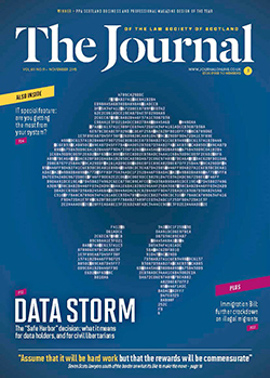Fraud and divorce – a Scottish Sharland?

Scottish family law practitioners may have read with interest about the Supreme Court decisions in the English appeals of Sharland [2015] UKSC 60 and Gohil [2015] UKSC 61. But what would have happened had these cases been heard in Scotland?
The English decisions
Judgments in the applications by Mrs Sharland and Mrs Gohil, which were heard together in June, were issued on 14 October. Both wives asked the court to set aside their divorce settlements as their husbands had deliberately and dishonestly misled them and the court.
Mrs Sharland’s agreement with her husband was reached relying on his assertion that his company would not imminently be put up for public sale, which assurance he gave to both parties’ valuers and in oral evidence. On that basis, the respective valuations were between £60 and £88 million. In fact, around that time, the husband was actively planning for sale at between £750 million and £1 billion.
Mrs Gohil discovered, some two to three years after
At the time of her application, Mrs Sharland was not yet divorced, and the consent order framing the financial settlement was not yet sealed by the court. Mrs Gohil took her first steps three years after her consent order was sealed and the divorce granted.
The Supreme Court allowed the wives’
A Scottish response?
A happy outcome for Mrs Sharland and Mrs Gohil – but would they have been as happy had their divorces been in Scotland?
For Mrs Sharland, not yet divorced, her route under Scots law would be to apply under s 16 of the Family Law (Scotland) Act 1985 to vary the financial agreement, on the basis that it was not fair and reasonable at the time it was entered into. The non-disclosure of information would be a very relevant factor in assessing reasonableness. Such variation of a financial agreement is however usually only possible at the time of granting
In such a case, the court can set that transfer aside. Interestingly, the court’s order can include terms and conditions, along with any ancillary order it considers expedient to ensure the order is effective. It has been considered that this provision may be wide enough to get round the problem that orders for a capital sum or property transfer order can usually only be granted on
There is provision to grant financial orders post-divorce in s 14 (incidental orders) of the 1985 Act, in
The final recourse where the parties are already divorced, the financial settlement was more than a year ago, and/or assets have simply not been disclosed rather than transferred to a third party, is to seek
It is however not straightforward to reduce a divorce decree. Assuming the case is defended, the applicant would need to show exceptional circumstances and that reduction is necessary in order to produce substantial justice. Given the money laundering constraints on the court in Gohil, it may be that no further financial order is made. Would
It is arguable that the Scottish system would benefit from greater facility to grant further financial orders post-divorce, in exceptional cases involving fraud or non-disclosure, without requiring
In this issue
- Appropriate adults and defence agents: who does what?
- Buying from a housing association: why consent matters
- Harassment: a civil claim?
- A welcome abroad: EYBA in London
- Reading for pleasure
- Opinion: David Faith
- Book reviews
- Profile
- President's column
- ScotLIS gets the green light
- People on the move
- Storm over Safe Harbor
- Light on a murky world
- Southern horizons
- Mediation minefield
- Migrants: no way to turn?
- The technological edge
- As our suppliers see us
- More rules to grapple with
- Fraud and divorce – a Scottish Sharland?
- What future for employment tribunal fees?
- Heading for a showdown on hard won human rights?
- Taxing question of relief
- Scottish Solicitors Discipline Tribunal
- How far can we rely on the register?
- All part of the game
- Law reform roundup
- From the Brussels office
- Poverty: a new front in the war
- Damage limitation: working it out
- Ask Ash
- A lawyer's lament
- Appreciation: Michael Scanlan






